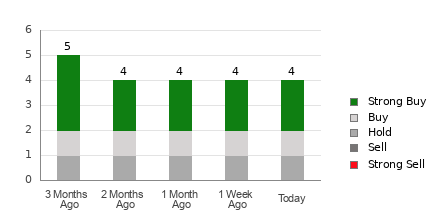The recommendations of Wall Street analysts are often relied on by investors when deciding whether to buy, sell, or hold a stock. Media reports about these brokerage-firm-employed (or sell-side) analysts changing their ratings often affect a stock's price. Do they really matter, though?
Let's take a look at what these Wall Street heavyweights have to say about Energy Fuels (UUUU) before we discuss the reliability of brokerage recommendations and how to use them to your advantage.
Energy Fuels currently has an average brokerage recommendation (ABR) of 1.75, on a scale of 1 to 5 (Strong Buy to Strong Sell), calculated based on the actual recommendations (Buy, Hold, Sell, etc.) made by four brokerage firms. An ABR of 1.75 approximates between Strong Buy and Buy.
Of the four recommendations that derive the current ABR, two are Strong Buy and one is Buy. Strong Buy and Buy respectively account for 50% and 25% of all recommendations.
Brokerage Recommendation Trends for UUUU

Check price target & stock forecast for Energy Fuels here>>>
While the ABR calls for buying Energy Fuels, it may not be wise to make an investment decision solely based on this information. Several studies have shown limited to no success of brokerage recommendations in guiding investors to pick stocks with the best price increase potential.
Are you wondering why? The vested interest of brokerage firms in a stock they cover often results in a strong positive bias of their analysts in rating it. Our research shows that for every "Strong Sell" recommendation, brokerage firms assign five "Strong Buy" recommendations.
This means that the interests of these institutions are not always aligned with those of retail investors, giving little insight into the direction of a stock's future price movement. It would therefore be best to use this information to validate your own analysis or a tool that has proven to be highly effective at predicting stock price movements.
With an impressive externally audited track record, our proprietary stock rating tool, the Zacks Rank, which classifies stocks into five groups, ranging from Zacks Rank #1 (Strong Buy) to Zacks Rank #5 (Strong Sell), is a reliable indicator of a stock's near -term price performance. So, validating the Zacks Rank with ABR could go a long way in making a profitable investment decision.
Zacks Rank Should Not Be Confused With ABR
In spite of the fact that Zacks Rank and ABR both appear on a scale from 1 to 5, they are two completely different measures.
Broker recommendations are the sole basis for calculating the ABR, which is typically displayed in decimals (such as 1.28). The Zacks Rank, on the other hand, is a quantitative model designed to harness the power of earnings estimate revisions. It is displayed in whole numbers -- 1 to 5.
It has been and continues to be the case that analysts employed by brokerage firms are overly optimistic with their recommendations. Because of their employers' vested interests, these analysts issue more favorable ratings than their research would support, misguiding investors far more often than helping them.
In contrast, the Zacks Rank is driven by earnings estimate revisions. And near-term stock price movements are strongly correlated with trends in earnings estimate revisions, according to empirical research.
In addition, the different Zacks Rank grades are applied proportionately to all stocks for which brokerage analysts provide current-year earnings estimates. In other words, this tool always maintains a balance among its five ranks.
There is also a key difference between the ABR and Zacks Rank when it comes to freshness. When you look at the ABR, it may not be up-to-date. Nonetheless, since brokerage analysts constantly revise their earnings estimates to reflect changing business trends, and their actions get reflected in the Zacks Rank quickly enough, it is always timely in predicting future stock prices.
Is UUUU Worth Investing In?
Looking at the earnings estimate revisions for Energy Fuels, the Zacks Consensus Estimate for the current year has remained unchanged over the past month at -$0.10.
Analysts' steady views regarding the company's earnings prospects, as indicated by an unchanged consensus estimate, could be a legitimate reason for the stock to perform in line with the broader market in the near term.
The size of the recent change in the consensus estimate, along with three other factors related to earnings estimates, has resulted in a Zacks Rank #3 (Hold) for Energy Fuels. You can see the complete list of today's Zacks Rank #1 (Strong Buy) stocks here >>>>
It may therefore be prudent to be a little cautious with the Buy-equivalent ABR for Energy Fuels.
Just Released: Zacks Top 10 Stocks for 2025
Hurry – you can still get in early on our 10 top tickers for 2025. Handpicked by Zacks Director of Research Sheraz Mian, this portfolio has been stunningly and consistently successful. From inception in 2012 through November, 2024, the Zacks Top 10 Stocks gained +2,112.6%, more than QUADRUPLING the S&P 500’s +475.6%. Sheraz has combed through 4,400 companies covered by the Zacks Rank and handpicked the best 10 to buy and hold in 2025. You can still be among the first to see these just-released stocks with enormous potential.
Energy Fuels Inc (UUUU) : Free Stock Analysis Report
To read this article on Zacks.com click here.
The views and opinions expressed herein are the views and opinions of the author and do not necessarily reflect those of Nasdaq, Inc.


